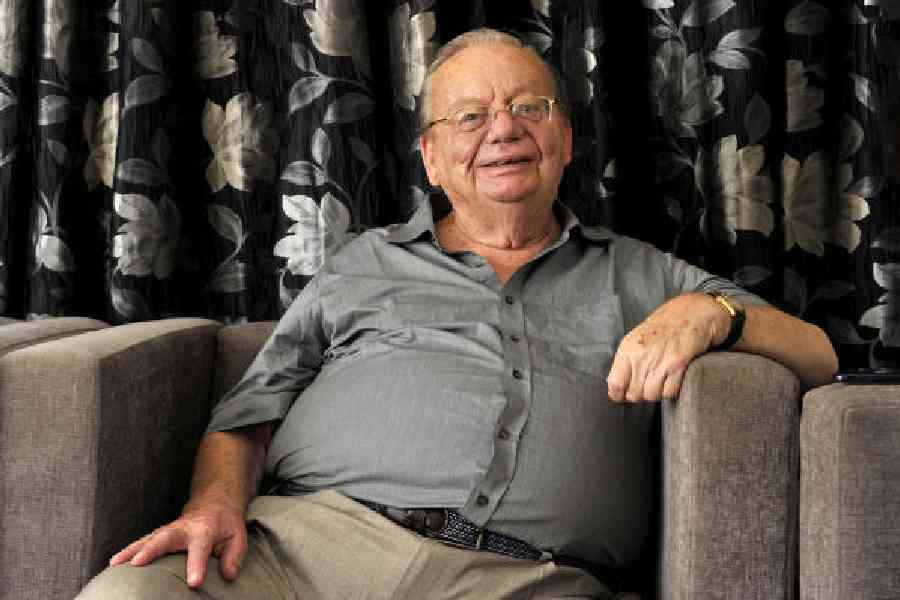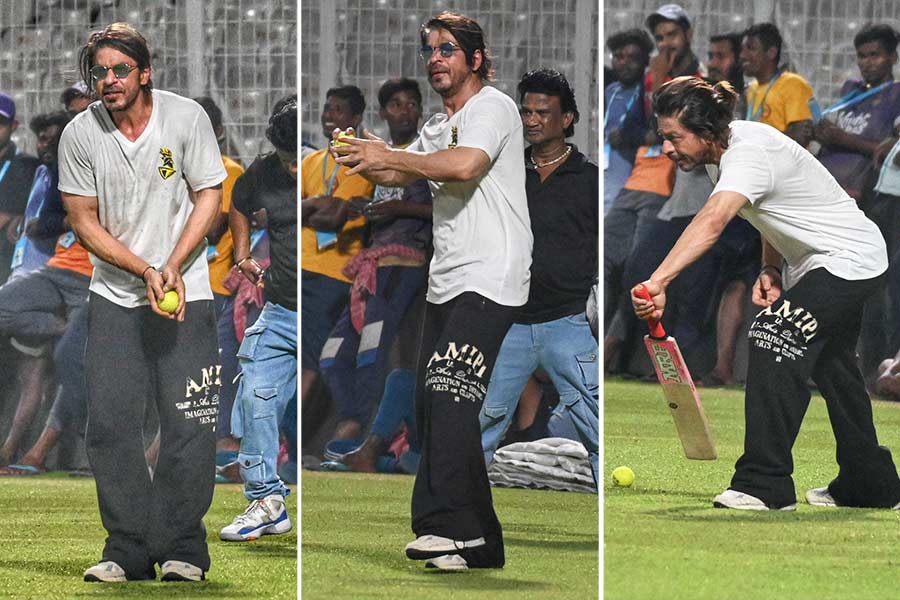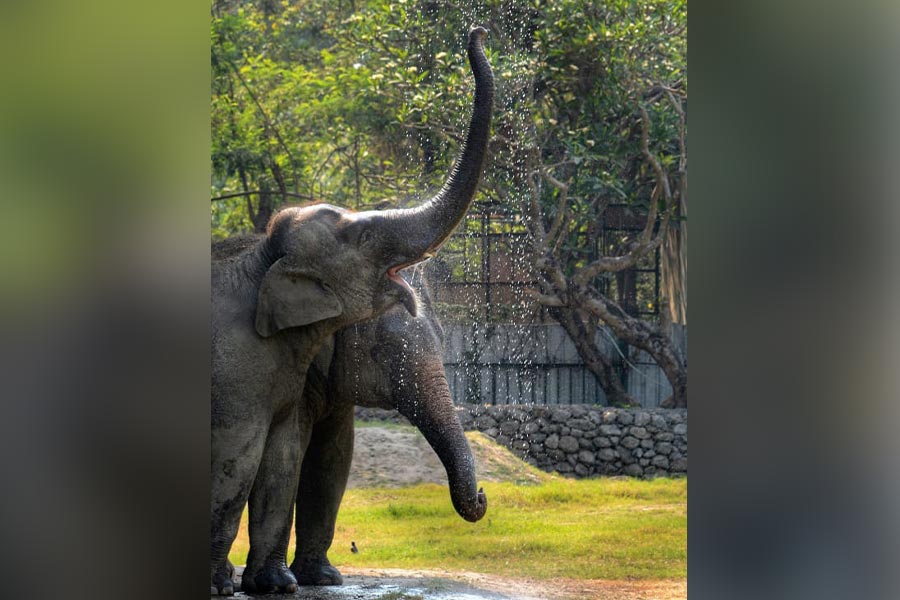One story from my childhood that my parents never get tired of recounting is when my family and I had visited Crossword, then on Elgin Road, and I had made a beeline for the fiction shelves, completely oblivious to the fact that one of the first authors I had ever read was also in the same room at that precise moment in time, surrounded by both children and adults as he signed copies of his books. Needless to say, yours truly wasn’t brave enough to go up to the author in question and ask for his autograph that day — oh, the blissful time before the selfie! — but many, many years later, as a student of English literature trying to find her footing in the subject, I had the honour and privilege of seeing Ruskin Bond live for the first time at a college literature event. It has been a few years since, and my life has come full circle. Days before the April 5 release of his latest book The Hoopoe on the Lawn, I had the surreal experience of being able to speak to Mr Bond via phone call, and when I confess I was entirely star-struck throughout our conversation, I do not exaggerate one bit.
Excerpts.
Congratulations on the release of The Hoopoe on the Lawn! What are you allowed to tell me about it?
Thank you very much. It’s an illustrated children’s short story which I wrote a few months ago, but I haven’t seen it yet! They haven’t sent me a copy but I look forward to seeing it soon. I have several new books coming out this year, some for adults, some for children, mostly because I’m going to be 90 years old and all my publishers think they should do something about it, and they’ve all put me to work harder than I normally do. This story is one of them.
As someone who’s read the book, I couldn’t help noticing that Hoopoe also brings out the themes of childhood, innocence, and the passage of time that are such a trademark of your children’s books. Would you say nostalgia is a major driving force in your work?
Yes, I have a very good memory of my childhood, and a particular affection for it. I don’t know, maybe it is nostalgia, like you said, but childhood seems somehow more vivid for me than later years. Particularly the early years I spent in Jamnagar with my parents, and then in Dehradun with my grandmother, so that’s the period I’ve written about.
Granny was a sort of fixture in Dehradun. She was very much on her own, Grandfather having passed away in his 60s, so I would occasionally spend holidays or part of my holidays with her. She was quite a strong character, as I try to bring out in the story, and she was very strict. She was the typical Victorian grandmother! She had quite firm beliefs… you know, things like little boys speaking only when they’re spoken to, and no second helpings at lunch or dinner, and one of her favourite proverbs, if I ate too much, was ‘Don’t let your tongue cut your throat!’ (laughs) But she was fond of me and she was quite helpful as I started growing up.
Then I mention in the story an old lady called Miss Kellner, who was also very good to me, though she was totally crippled. She couldn’t walk or move around much, having had an accident when she was young. And then of course there was Dhuki the gardener, who I was always close to because I would really pester him a lot of the time. I used to ask him about different flowers and plants… he liked watering the garden even if it had already been watered a few times! He was like a watering can by himself. So, all these things were always there, and I put them together to try and make a little plot out of them all. Although I’m not very good at plots. I write more character than plot.
But anyway, I do often go back to the same period. It might be my childhood in Dehradun or Jamnagar or Delhi with my father, and sometimes I dwell on different aspects of that particular period. Maybe I omit or forget some events which come back to me later on, and then I put them in another story. So, I guess one’s memory of childhood does get fragmented as we get older and sometimes it’s difficult to tell in what order things happened. But I think my memory is good for places and people and adults, mostly because I didn’t know many other children till I went to boarding school. A lot of the people I remember from my childhood are adults. Either they’re grandparents or they’re uncles and aunts or they’re neighbours… all quite eccentric! And the boys I made friends with came along when I was 12 or 13 in boarding school. And boarding school has also formed the background for some others of my stories. Maybe I’ll write more of those now!
But I try to do a little every day. I don’t overwork, I’ve never been one for too much work but I try to write a page or two every morning. It’s sort of like journalling, in a way, and I can go back to my journal for stories and other things. My eyesight is poor now, so I really have to put my nose right down to the page when I read but I still manage to do a certain amount, and in the meantime here I am sitting in my little sun verandah, surrounded by geraniums. Dhuki taught me to grow geraniums and I’m still growing them!
What motivates you to share such personal stories with readers?
I suppose I am a personal kind of writer. I write a lot out of my own life, and I believe that’s what I write best. So, of course, when I do write about school life, I’ll be writing about real boys that I knew, or real teachers, and sometimes relatives too, though I might well exaggerate facts if I want to! To write a particular uncle or teacher an eccentric or comic character, I might well exaggerate many of their traits. Like my Uncle Ken! He went through life without doing any work quite successfully because he had four sisters — my aunts — and he would divide his time between them. They were all quite comfortably married, so he would divide the year between them — two months in Ranchi, two months in Calcutta, two in Mussoorie and so on. It’s only when Independence came and they all left the country — except my mother — that Uncle Ken had to go too and then in England of course nobody was going to look after him. So, he had to finally take a job and he became a postman. He used to ride about the village on a bicycle and I do believe he used to read other people’s letters and go in for a bit of blackmail on the side! (laughs) So yeah, he’s long gone but he provides me with a few stories every now and then.
Hoopoe is a children’s book, but many of your readers are adults. And, of course, you’ve written several books for adults as well. How do you adapt your writing style and themes for different age groups?
Yes, I’ve been very lucky and I’m very grateful for it. I’ve been writing since the 1950s! My first novel (The Room on the Roof) was published in 1956, although I had written it a couple of years before. It took me two years to get it published. I’ve been writing pretty well since, regularly or full-time, and of course Hoopoe goes back to the 1940s and 50s and nobody has objected so far! I suppose they like me to be old-fashioned, that I belong to an era that nobody knows much about now. You know, only the other day I was talking to some people in Dehradun and I realised that I was probably the only person still around who remembered that it snowed in Dehradun in 1945, when I was a small boy, and it’s never snowed there again. It’s not a place where you usually get snow, but that year was a freak year, and I haven’t found anybody around now who was there then. So, I guess it’s interesting to be able to tell people about a time that’s long gone and to bring it to life again. That’s what I try to do, bring it to life again through its characters and incidents and my feelings for the period and the people and the friends I had. In a way, the longer you live, the more you have to write about, as long as you have a good memory.
Looking back on your career, is there a particular story or book that holds special significance for you?
My first book was something I took a lot of trouble over. I was young then and the first two or three drafts didn’t seem to come off right and the good editor I had in London made me work at it again and again until finally I had written a novel that they thought could be published. I’ve never worked so hard on a book or story again after that. I write freely now… I don’t even edit much, if I were honest. But I did all that for my first one. And then over the years I’ve had to do it again for particular short stories… but I enjoy everything that I write, really, otherwise I wouldn’t be wasting my time on it.
If it’s not going well, then after the first page I’ll just chuck it away, crumple it up and throw it in the wastepaper basket. So, I have to be enjoying it in order to finish it. I enjoyed writing Hoopoe, too. It was good going back and talking again about Dhuki and Granny and Miss Kellner. I hope I can convey some of that enjoyment to the reader.
Writing, over the years, has not been a task for me. Although I’ve made a living from it — and sometimes I haven’t made a living from it, when times were hard — but overall, I am fortunate to still be here, still writing. Like I said, I turn 90 next month and I have more readers now than I’ve ever had. And these are all young, modern readers, so it’s not like I’m writing for old-timers or people who are missing the good old days. I think 80 per cent of my readers are in their teens or 20s, or like you, they read me when they were growing up. So, some are loyal, old readers, of any age, who read some of my stuff 20-30 years ago.
I’m lucky because I’ve had about three generations of readers and that keeps growing in actual numbers. And over the years, a lot of my stories have gone into the school, sometimes college curriculum, and those have become well-known. Some particular stories are better known than others because they were in the school or educational curriculum. And that really has helped. So I’m lucky in lots of ways, let’s say.
You mentioned you’re already working on your next projects. What can readers look forward to?
Oh, yes, I’ve been writing a lot of non-fiction lately. I’ve done a book for Aleph called The Hill of Enchantment: My Life as a Writer, which is not so much personal autobiography as actually about the writing life. Then I’ve done another little book for Harper called How to Be Happy. Very simple title, very simple book. The third one is for Penguin and it’s called Hold On to Your Dreams. Now this is for young or old or anybody who still has a dream. I have to keep all these publishers happy, and they insist on trying to bring everything out around my birthday (May 19), so it’s not my fault my books aren’t being spread around over the year! It’s their fault if the books clash. And then… let’s see, now I’ve got to write something for the end of the year. Hopefully, if I’m still around and God willing, I’ll have something else.
Finally, generations of children have grown up reading your books. Who are some of your favourite authors?
Oh, it varies! My favourite authors vary over the years. I read a lot and very often favourites change, and books that you grow up on, when you go back to them over the years they don’t seem quite so attractive. But there are books that I’ve read two or three times and they still give me pleasure. One of them is (Emily Bronte’s) Wuthering Heights. I’ve read it about three times and it always excites me. It’s full of so much passion and feeling. I must be reading three books a week nowadays, and I like reading detective stories and crime thrillers. I like biography, too — a good biography of a writer, or anyone who’s done something interesting. So there you are. I could make a list of a hundred favourite writers!
And I do like poetry, too. Walter de la Mare and John Clare and (Robert Louis) Stevenson… I write a little poetry now and then myself, but publishers don’t like publishing poetry! So, I slip my poems into my prose or sometimes into my stories or essays and try to get away with it. I’m very cunning that way!






